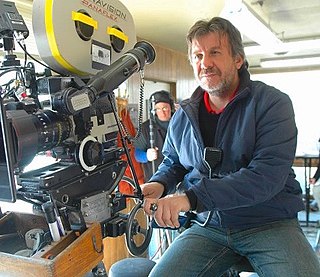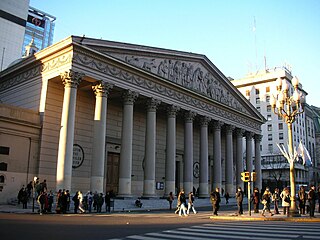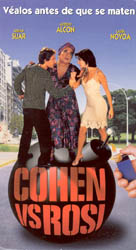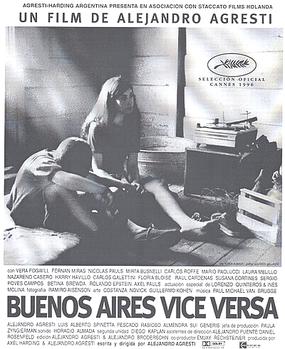Related Research Articles

The La Chacarita Cemetery is a cemetery located in the Chacarita neighborhood in Buenos Aires, Argentina. Occupying an area of 95 hectare, it is the largest in the country.

Alejandro Agresti is an Argentine film director, writer and producer. A prominent filmmaker in his country, he also directed The Lake House with Hollywood actors Sandra Bullock and Keanu Reeves in 2006.

The Metropolitan Archdiocese of Buenos Aires is a Latin Church ecclesiastical territory or archdiocese of the Catholic Church in Argentina. It is a metropolitan archdiocese with 13 suffragan sees in the country, including two Eastern Catholic eparchies.
The Act in Question is a 1994 Argentine film directed and written by Alejandro Agresti. The film starred Carlos Roffé and Sergio Poves Campos. The film was also released in the Netherlands and Portugal. It was screened in the Un Certain Regard section at the 1993 Cannes Film Festival.

Pedro López Lagar was a Spanish-born Argentine film actor, notable for his work during the Golden Age of Argentine cinema in the 1940s and 1950s.

Love Is A Fat Woman is a 1987 Argentine drama film written and directed by Alejandro Agresti.

Cohen vs. Rosi is a 1998 Argentine romantic comedy film directed by Daniel Barone and written by Jacobo Langsner. It stars Alfredo Alcón, Adrián Suar and Laura Novoa. The film premiered on 28 May 1998 in Buenos Aires.

Such Is Life is a 1939 Argentine melodrama film directed by Francisco Múgica and starring Enrique Muiño, Elías Alippi, Enrique Serrano and Sabina Olmos. It is one of the most celebrated films of the Golden Age of Argentine cinema. Based on a successful play of the same title by Nicolás de las Llanderas and Arnaldo Malfatti, it focuses on the history of a bourgeois family from Buenos Aires from the beginning of the 20th century to the present. A Mexican remake Orange Blossom for Your Wedding was released in 1950.

Carlos Roffé was an Argentine film and television actor active between 1969 and 2005.

Una noche con Sabrina Love is a 2000 Spanish-language film written and directed by Alejandro Agresti and based on the Pedro Mairal novel. It stars Cecilia Roth as Sabrina Love and Tomás Fonzi.

Buenos Aires Vice Versa is a 1996 Argentine and Dutch dramatic film, written and directed by Alejandro Agresti. The film was produced by Alejandro Agresti and Axel Harding, and co-produced by Emjay Rechsteiner.
Gold in Clay is a 1939 Argentine musical film directed by Luis Bayon Herrera during the Golden Age of Argentine cinema. The tango film premiered in Buenos Aires and stars Tito Lusiardo.
Gente bien is a 1939 Argentine musical film of the Golden Age directed by Manuel Romero. The tango film premiered in Buenos Aires on June 28, 1939 and the United States on October 8, 1939 and starred Hugo del Carril, Tito Lusiardo and Delia Garcés.

The Girl's Houseboy is a 1951 Argentine musical comedy film of the classical era of Argentine cinema, directed by Enrique Carreras on his directorial debut with Juan Sires. It is based on a play by Nato Lamarque, which he adapted for the screen. It stars Lolita Torres, Alfredo Barbieri, Tito Climent and Gogó Andreu and was released on 24 October 1951 in Buenos Aires.

El Juramento de Lagardere is a 1955 Argentine film directed by León Klimovsky, based on a screenplay by Emilio Villalba Welsh after the French novel Le Bossu -El jorobado by Paul Féval. The film stars Carlos Cores, Elsa Daniel, Andres Mejuto and Golde Flami, and premiered on December 11, 1955.

Enrique Serrano (1891–1965) was an Argentine actor and comedian notable for his work during the Golden Age of Argentine cinema.

Orange Blossom for Your Wedding is a 1950 Mexican historical comedy drama film directed by Julián Soler and starring Fernando Soler, Sara García and Marga López. It was shot at the Azteca Studios in Mexico City. The film's sets were designed by the art director Jorge Fernández. It is a remake of the 1939 Argentine film Such Is Life.
A Less Bad World is a 2004 Argentine drama film directed by Alejandro Agresti and focused on the Argentina's Dirty War.

El encargado is an Argentine comedy drama television series created by Mariano Cohn and Gastón Duprat originally for Star+. Guillermo Francella stars in the lead role of Eliseo, a doorman of a high-class apartment building in Belgrano, Buenos Aires, who deals with some problems with the neighbors who don't want him anymore as doorman and want to remove his job. To avoid this, he is resorting to unethical moves to keep his job, like invading the privacy of the owners of the apartments. The supporting cast includes Gabriel Goity, Gastón Cocchiarale, and Pochi Ducasse, alongside Moro Anghileri in season one, María Abadi and Martín Slipak in the second season, and Manuel Vicente in season three after recurring in the previous seasons.
References
- ↑ "Boda Secreta (1989)". Archived from the original on 16 July 2019.
- ↑ "Filmoverzicht".
- ↑ ""Boda secreta" se estrena en Canal 7". 26 June 2004.